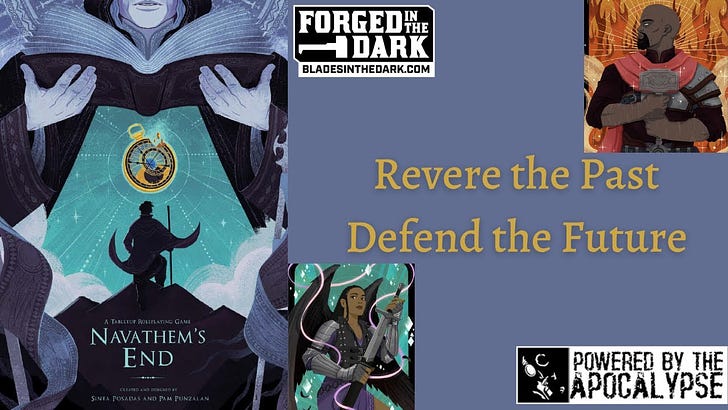I. Dear Reader,
This week, I’m having complex feelings about a recent’ fantastic post from Lowell Francis on the Gauntlet blog. In this blog, describes the five faces of the GM: GM as traffic manager, GM as meeting manager, GM as interviewer, GM as showrunner, GM as counselor. Lowell is a designer as well as one of the most prolific GMs that I know so when he talks about GMing, it’s always useful to pay attention.
Lowell starts about by talking about how storygames have moved away from the GM as authority figure (both narratively and at the table). But I still feel like some parts of the GM role are still a bit lop-sided. I think GM as traffic manager (pacing), GM as interviewer (enabling players to express their characters), and GM as showrunner (thinking about theme and continuity) are central “in-game responsibilites” over and above the average player. In fact, I’d add at least one more, GM as teacher (rules, both written and unwritten).
But both GM as counselor (creating trust and maintaining safety) and GM as meeting manager (organizing the session) are “out-of-game responsibilites” and strike me a bit differently. Safety is obviously something that a table does together but giving the GM some extra responsibility (or authority) towards this is probably a good thing. The GM being able to say, “If you’re going to behave like this, you can’t play at my table” (and players knowing that the GM can say that) is a big part of trust and believing that safety is possible.
But GM as meeting manager still annoys me a little. Some of this is “in-game” and some of this is “out of game”. These out of game responsibilities include stuff like organzing the session, wrangling attendance, maintaining an agenda, ensuring agenda is enacted, and so on. I just wish it was more normalised that a player might take on these responsibilities. I think I'm going to try it this year - organize one mini campaign where someone else will GM and I'll organize. Let's see how it goes. Maybe it won't work but maybe it will!
Yours responsibly,
Thomas
II. Watch of the Week
On AA Voigt’s channel, a look at Navathem’s End, a tabletop roleplaying game about saving the world from the apocalypse… again and again.
A bit late on this: Collabs without Permission uploads their full interview with Zedeck Siew. Zedeck is always a great interviewee.
III. Links of the Week
Narrative designer Meghna Jayanth gives a talk titled Game Design in the Imperial Mode: “I work in video games and I have complicated feelings about it. Or even, how does living and working amidst the crises of capital and empire — in this imperial mode of living — shape what video games are and what they mean?”
On the IGRC, Paul Beakley talks about lore in tabletop games using IKEA furniture metaphors: “Lore as an IKEA catalog: Evocative, lots of context, an invitation to imagine yourself in the space. This is old-school heavy lore like you’d read in the first edition of Exalted or Shadowrun. Indie gaming has mostly left this approach behind – and boy do I miss it!”
Monte Cook Games announced a Cypher System Open License.
Chase Carter of Dicebreaker writes about a huge Queer Games Bundle on itch.io that is trying to showcase and promote queer game designers.
Third Kingdom Games continues their interview series with OSR creators: the latest is with Humza Kazmi of the Hydra Co-op. Older posts in the series included Ava Islam and others.
On the Burn After Running blog, a nice post about sharing narration in the storygame way: “I hope we’ve moved a long way from the GM-responsible-for-fun model of RPG delivery – everyone at the table needs to help.”
IV. Small Ads
All links in the newsletter are completely based on my own interest. But to help support my work, this section contains sponsored links and advertisements. If you’d like your products to appear here, read the submission form.
Lifted Vol1, the people with powers RPG Primed by Cortex is live on Kickstarter! C'mon out and team-up!
This newsletter is currently sponsored by the all-new, fan-supported Fate-SRD.com. Built to be fast, attractive, and accessible, check out the site for rules, downloads, actual plays, and community.
Hello, dear readers. This newsletter is written by me, Thomas Manuel. I’m half-man, half-beast, half-journalist, half-game designer.
If you’d like to support this newsletter, share it with a friend or buy one of my games from my itch store. If you’d like to say something to me, you can reply to this email or click below!
Thanks for subscribing and take care out there!



I do think more groups should delegate "meeting manager" responsibilities differently. For instance, I see use in designating a non-GM player as the time tracker, reminding the table when to take breaks and when it's near the end of the session.
At the same time, I understand why the GM has traditionally been the assumed meeting manager. While a game can go on with one non-GM player, it can get very awkward if the GM doesn't show up to a pre-scheduled session. If the GM weren't the organizer, the thinking goes that the GM might not be as invested in showing up and nudging other players to show.
The solution may involve a group having plans for if the GM doesn't show, such as having an alternative game and players who are willing to assume GM duties. This is a departure of the assumed default model that RPG groups come together for one game only, and I wonder if more groups would benefit from departing from that model.